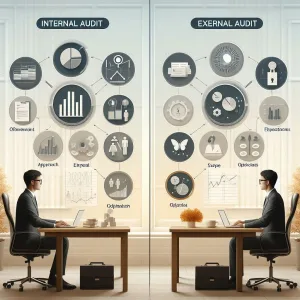Forensic accounting is a specialized field that combines accounting, auditing, and investigative skills to examine financial records and transactions for the purpose of uncovering fraud, misconduct, or discrepancies. But how much does a forensic accountant cost? This discipline plays a crucial role in various sectors, particularly in internal audits and fraud investigations, where the integrity of financial information is paramount.
Definition of Forensic Accounting
Forensic accounting involves the application of accounting principles and techniques to legal matters, often in the context of litigation. Forensic accountants are trained to analyze financial data, identify irregularities, and provide expert testimony in court if necessary. Their work is essential in uncovering illegal activities that may have been overlooked by internal audit teams or external auditors, thereby ensuring that organizations maintain transparency and accountability in their financial practices [2][8].
Importance of Forensic Accounting in Internal Audit and Fraud Investigation
The significance of forensic accounting in internal audits cannot be overstated. It serves as a proactive measure to detect and prevent fraud, ensuring that organizations can safeguard their assets and maintain stakeholder trust. Forensic accountants are often called upon to investigate suspicious activities, such as embezzlement or financial misreporting, which can have severe implications for a business’s reputation and financial health. By identifying and addressing these issues early, forensic accountants can help organizations avoid substantial financial losses and legal repercussions in the future [1].
Overview of Typical Scenarios Where Forensic Accountants Are Engaged
Forensic accountants are engaged in a variety of scenarios, including but not limited to:
- Fraud Investigations: When there are allegations of fraud, forensic accountants are tasked with uncovering the truth behind financial discrepancies. This may involve analyzing financial statements, transaction records, and other relevant documents to identify any illegal activities [2][8].
- Litigation Support: In cases of legal disputes, forensic accountants provide expert analysis and testimony regarding financial matters. Their insights can be critical in court cases involving financial fraud, divorce settlements, or business valuations [9][10].
- Internal Audits: Organizations may hire forensic accountants to conduct thorough internal audits, especially when there are signs of potential misconduct or when a company is undergoing significant changes, such as mergers or acquisitions [1].
- Regulatory Compliance: Forensic accountants help businesses comply with financial regulations by ensuring that their accounting practices are transparent and in line with legal standards. This is particularly important in industries that are heavily regulated [8].
Forensic accounting is an essential component of financial integrity and accountability within organizations. Understanding its role and the scenarios in which forensic accountants are engaged sets the stage for a deeper exploration of the costs associated with these specialized services. As we delve into the factors contributing to the high fees of forensic accounting, it becomes clear that the expertise and thoroughness required in this field justify the investment for businesses seeking to protect their financial interests.
Understanding Forensic Accounting Fees
Forensic accounting is a specialized field that often comes with a significant price tag. Understanding the factors that contribute to these costs can help finance professionals and business owners make informed decisions when hiring a forensic accountant. Here, we explore the typical fee structures, compare them with traditional accounting services, and discuss how case complexity and duration can affect overall costs.
Typical Fee Structures
Forensic accountants typically charge based on several fee structures, including:
- Hourly Rates: Most forensic accountants charge between $150 to $400 per hour, with rates increasing for more complex cases or larger organizations. Senior staff may command even higher rates, ranging from $250 to $650 per hour depending on their expertise and the nature of the work involved [10].
- Flat Fees: In some instances, forensic accountants may offer flat fees for specific services, such as preparing a forensic accounting report. However, this is less common due to the unpredictable nature of forensic investigations.
- Retainer Agreements: Some clients may opt for retainer agreements, where they pay a set fee upfront for a certain number of hours or services. This can provide cost predictability for ongoing forensic accounting needs.
Comparison with Traditional Accounting Services
When comparing forensic accounting fees to traditional accounting services, several distinctions emerge:
- Higher Rates: Forensic accounting services are generally more expensive than standard accounting services due to the specialized skills required and the complexity of the investigations. Traditional accountants may charge lower rates, typically ranging from $100 to $300 per hour, depending on their services [11].
- Scope of Work: Forensic accountants often engage in detailed investigations that require extensive analysis of financial records, which is not typically necessary in standard accounting practices. This added complexity justifies the higher fees associated with forensic services.
Variability in Fees Based on Case Complexity and Duration
The cost of hiring a forensic accountant can vary significantly based on several factors:
- Complexity of the Case: More intricate cases, such as those involving fraud investigations or extensive asset tracing, will naturally incur higher fees. The more complex the task, the greater the time and resources required, leading to increased costs [1][12].
- Duration of the Investigation: The length of time needed to complete the forensic accounting work also plays a crucial role in determining fees. Longer investigations that require thorough examination of numerous financial documents will result in higher overall costs [11][15].
Understanding the fee structures and the factors influencing the costs of forensic accounting services can empower finance professionals and business owners to budget effectively and select the right services for their needs. By recognizing the complexities involved, clients can better appreciate the value that forensic accountants bring to their investigations.
Factors Influencing Forensic Accounting Costs
Forensic accounting is a specialized field that combines accounting, auditing, and investigative skills to uncover financial discrepancies and fraud. As such, the costs associated with hiring a forensic accountant can be significant. Understanding the various factors that contribute to these fees is essential for finance professionals and business owners alike. Here are the key elements that influence the pricing of forensic accounting services:
- Expertise and Qualifications of the Accountant: The level of expertise and qualifications of a forensic accountant plays a crucial role in determining their fees. Accountants with advanced certifications, such as Certified Fraud Examiner (CFE) or Certified Public Accountant (CPA), typically command higher rates due to their specialized knowledge and experience. Senior forensic partners with extensive backgrounds in complex financial investigations may charge hourly rates ranging from $200 to over $500, reflecting their advanced skill set and the value they bring to intricate cases [12][13].
- Complexity and Scope of the Investigation: The nature of the investigation significantly impacts the cost. More complex cases, such as those involving multiple entities, extensive documentation, or intricate financial transactions, require more time and resources to resolve. Conversely, simpler cases may incur lower fees. For instance, if the investigation pertains to missed payments over a specific period, the costs could be on the lower end of the spectrum [14].
- Geographical Location and Market Rates: The geographic location of the forensic accountant can also affect pricing. In metropolitan areas with a high cost of living, fees are generally higher compared to those in smaller towns or rural regions. This variation is due to the local market rates and the demand for forensic accounting services in different areas [2][11].
- Technological Tools and Resources Required: Forensic accountants often utilize advanced technological tools and resources to conduct thorough investigations. The costs associated with these tools, including software for data analysis and forensic auditing, can contribute to the overall fees. The investment in technology is essential for ensuring accurate and efficient investigations, which can justify higher costs [10].
- Time Sensitivity and Urgency of the Case: The urgency of the investigation can also influence costs. Cases that require immediate attention or have tight deadlines may incur additional fees due to the need for expedited services. Forensic accountants may prioritize urgent cases, which can lead to increased costs as they allocate more resources to meet the client’s timeline [15].
The costs associated with hiring a forensic accountant are influenced by a combination of factors, including the accountant’s expertise, the complexity of the case, geographical location, technological requirements, and the urgency of the investigation. Understanding these elements can help finance professionals and business owners make informed decisions when seeking forensic accounting services.
The Role of Experience and Specialization
When it comes to forensic accounting, the fees charged by professionals can vary significantly based on their experience and specialization. Understanding these factors is crucial for finance professionals and business owners who may need to engage a forensic accountant for various purposes, including internal audits, fraud investigations, or litigation support.
Difference in Fees Between General Accountants and Specialized Forensic Accountants
Forensic accountants typically command higher fees than general accountants due to their specialized skill set and the nature of their work. While general accountants may charge between $150 to $300 per hour, forensic accountants often charge between $300 to $500 per hour, depending on the complexity of the case and their level of expertise [14]. This disparity arises because forensic accountants are trained to handle intricate financial investigations, requiring a deeper understanding of accounting principles, legal frameworks, and investigative techniques.
Impact of Certifications on Pricing
Certifications play a significant role in determining the fees charged by forensic accountants. Credentials such as Certified Fraud Examiner (CFE) and Certified Public Accountant (CPA) not only enhance a professional’s credibility but also justify higher rates. For instance, a forensic accountant with a CFE designation is recognized for their expertise in fraud detection and prevention, which can be invaluable in high-stakes situations. The presence of such certifications often correlates with a higher hourly rate, reflecting the additional training and knowledge that these professionals bring to the table [12][15].
The fees associated with forensic accounting are influenced by a variety of factors, particularly the experience and specialization of the accountant. For finance professionals and business owners, investing in a qualified forensic accountant can lead to significant returns, making it a worthwhile consideration in any financial investigation or audit.
Hidden Costs of Forensic Accounting
Forensic accounting is a specialized field that often comes with a hefty price tag. Understanding the various factors that contribute to these costs is essential for finance professionals and business owners who may need these services. Here, we delve into the hidden costs associated with forensic accounting that may not be immediately apparent to clients.
1. Data Acquisition and Analysis Costs
One of the primary expenses in forensic accounting is the cost associated with data acquisition and analysis. Forensic accountants often need to gather extensive financial records, transaction histories, and other relevant data to conduct a thorough investigation. This process can involve:
- Data Extraction: The extraction of data from various sources, including databases, accounting software, and even physical documents, can be time-consuming and may require specialized tools or software.
- Data Analysis: Once the data is collected, forensic accountants must analyze it to identify discrepancies, fraud, or other irregularities. This analysis often requires advanced analytical techniques and tools, which can add to the overall cost of the service [1].
2. Travel Expenses
Forensic accountants may need to travel for fieldwork or client meetings, especially if the case involves multiple locations or requires on-site investigations. Travel expenses can include:
- Transportation Costs: Airfare, car rentals, and mileage reimbursement can accumulate quickly, particularly for long-distance travel.
- Accommodation and Meals: If the investigation requires overnight stays, costs for hotels and meals can further increase the overall expense [2][10].
3. Litigation Support and Expert Testimony
In many cases, forensic accountants are called upon to provide litigation support or expert testimony in court. This aspect of their work can significantly impact costs due to:
- Preparation Time: Preparing for court appearances, including reviewing case materials and formulating expert opinions, can be labor-intensive and time-consuming.
- Court Appearance Fees: Forensic accountants may charge additional fees for their time spent in court, which can vary based on their level of expertise and the complexity of the case.
4. Long-Term Engagement Considerations
Forensic accounting engagements can often extend over a long period, leading to additional costs that clients may not initially consider. These can include:
- Retainer Fees: Some forensic accountants require retainer fees for ongoing services, which can add to the upfront costs.
- Extended Engagements: If the investigation is complex or requires additional time due to unforeseen circumstances, clients may face escalating costs as the engagement continues.
The costs associated with forensic accounting can be substantial, influenced by various factors that go beyond the initial service fees. By understanding these hidden costs—ranging from data acquisition and travel expenses to litigation support and long-term engagement considerations—finance professionals and business owners can better prepare for the financial implications of hiring a forensic accountant. This awareness can lead to more informed decision-making and budgeting when it comes to engaging these specialized services.
Budgeting for Forensic Accounting Services
When it comes to forensic accounting, understanding the costs involved is crucial for finance professionals and business owners alike. The fees associated with these services can vary significantly based on several factors. Here’s a breakdown of what influences these costs and how businesses can effectively budget for them.
Establishing a Clear Scope of Work to Manage Costs
One of the most effective ways to control expenses in forensic accounting is to establish a clear scope of work from the outset. This involves:
- Defining Objectives: Clearly outline what you need from the forensic accountant, whether it’s fraud detection, litigation support, or financial analysis. A well-defined objective helps in avoiding unnecessary work and associated costs [10].
- Identifying Key Areas: Focus on specific areas of concern within your organization. By narrowing down the scope, you can prevent the engagement from expanding into more costly territories [12].
Prioritizing Needs Based on Potential Risks and Benefits
Understanding the potential risks and benefits of forensic accounting services can help prioritize needs effectively:
- Risk Assessment: Evaluate the risks your business faces and prioritize forensic accounting services that address these risks. For instance, if fraud is a significant concern, investing in a thorough forensic audit may be justified [11].
- Cost-Benefit Analysis: Weigh the potential benefits of hiring a forensic accountant against the costs. This analysis can guide you in deciding whether the investment is worthwhile, especially in high-stakes situations [15].
Strategies for Negotiating Fees and Structuring Payments
Negotiating fees and structuring payments can significantly impact the overall cost of forensic accounting services:
- Understanding Fee Structures: Forensic accountants may charge hourly rates that vary based on their expertise and the complexity of the case. Rates can range from approximately $250 for junior staff to $650 for senior professionals [14]. Knowing this can help you negotiate better.
- Fixed Fees vs. Hourly Rates: Consider negotiating a fixed fee for specific services rather than an hourly rate. This can provide more predictability in budgeting and help manage costs effectively [10].
- Payment Plans: Discuss the possibility of structured payments based on milestones or deliverables. This approach can ease cash flow concerns and ensure that payments align with the progress of the work [12].
Budgeting for forensic accounting services requires careful consideration of various factors, including the scope of work, risk prioritization, and fee negotiation strategies. By taking these steps, businesses can better manage costs while ensuring they receive the necessary expertise to address their financial concerns effectively.
Conclusion: Making Informed Financial Decisions
In the realm of forensic accounting, understanding the costs involved is crucial for finance professionals and business owners alike. The fees associated with hiring a forensic accountant can vary significantly, influenced by several key factors:
- Complexity of the Case: The intricacy of the financial issues at hand plays a major role in determining costs. More complex cases require more time and expertise, leading to higher fees [1][12].
- Experience and Reputation: Forensic accountants with extensive experience and a strong reputation often command higher rates. Their expertise can be invaluable in navigating complicated financial investigations [14].
- Scope of Investigation: The breadth of the investigation, including the volume of financial records and the number of years under review, directly impacts the time and resources required, thus affecting overall costs [12].
- Location: Geographic factors can also influence pricing, as rates may vary based on regional market conditions and the cost of living [1].
- Hourly Rates: Generally, forensic accountants charge between $150 and $400 per hour, with specialized services potentially costing even more. For instance, average divorce cases can exceed $3,000, depending on the complexity involved [10][13].
As businesses consider engaging forensic accounting services, it is essential to weigh these costs against the potential risks of not conducting a thorough investigation. The financial implications of fraud, embezzlement, or mismanagement can far exceed the costs of hiring a skilled forensic accountant. Therefore, conducting a cost-benefit analysis is advisable to ensure that the investment in forensic accounting is justified by the potential savings and risk mitigation it offers [3][15].
In selecting the right forensic accountant, businesses should prioritize not only cost but also the accountant’s investigative skills, experience, and ability to communicate effectively. A good working relationship can lead to more efficient investigations and potentially lower costs over time [5][9]. By making informed decisions, finance professionals and business owners can better protect their interests and ensure the integrity of their financial operations.
Find out more about Shaun Stoltz https://www.shaunstoltz.com/about/
This post was written by an AI and reviewed/edited by a human.



